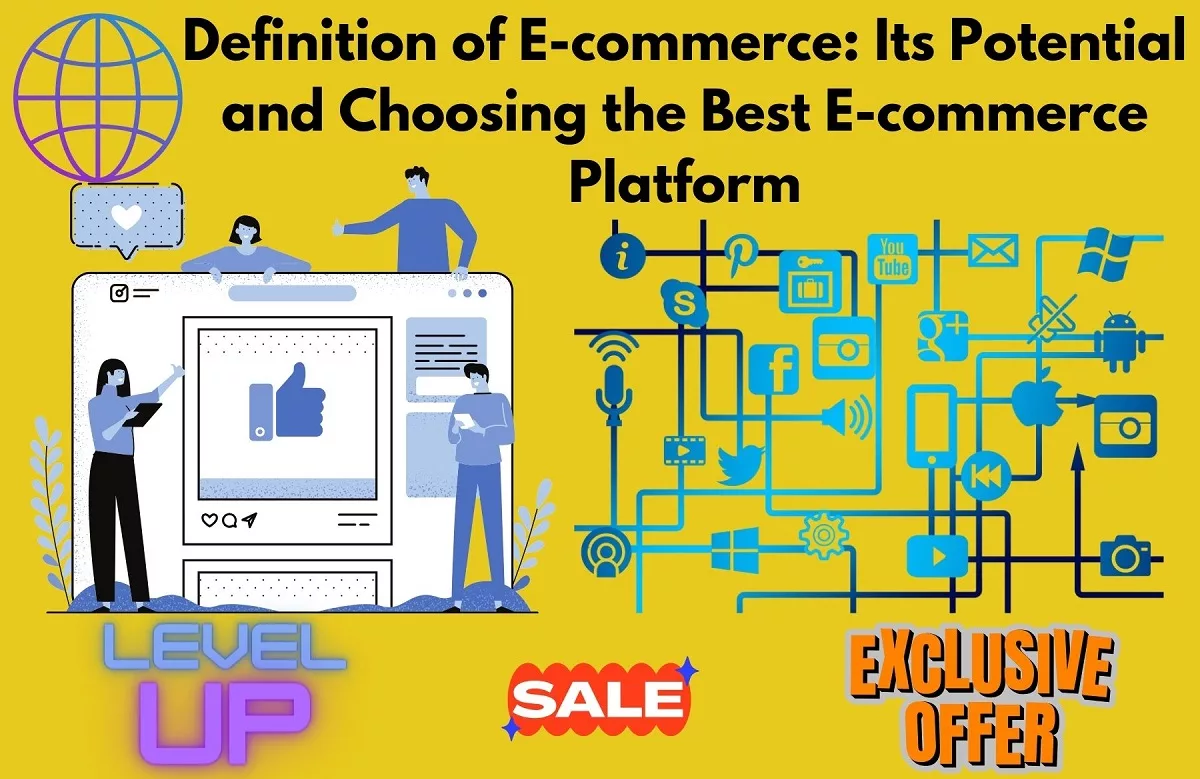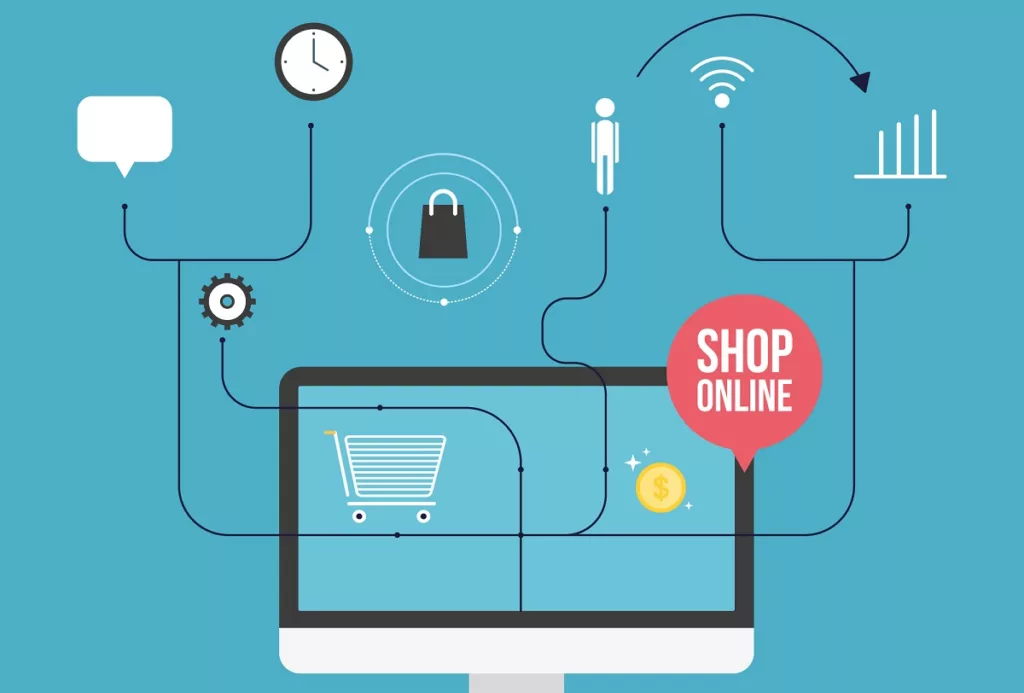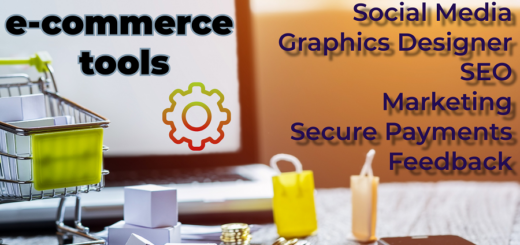Definition of E-commerce: Its Potential and Choosing the Best E-commerce Platform

If you are searching for the best definition of e-commerce, then your search ends here with nastech24.
Yes its true, e-commerce has changed the way we buy and sell products and provide services through the Internet. In simple terms to define e-commerce, it refers to any transaction conducted online. Starting from purchasing clothes and gadgets to booking travel tickets and secondly paying bills, e-commerce has become an integral part of our daily lives. It is further adding to the topic of e-commerce that as the world becomes increasingly digital, understanding the nuances of e-commerce is crucial for businesses to thrive in the modern marketplace.
Defining the Different Types of E-commerce models
Although, e-commerce can be defined and classified into several types based on the nature of the transactions and the parties involved. The most common types include:
Business-to-Consumer (B2C):
Firstly, this is the most well-known type of e-commerce, where businesses sell products or services directly to consumers. Think of online retail giants like Amazon and Alibaba.
Business-to-Business (B2B):
Secondly, e-commerce involves companies selling goods or services to other companies. Larger transactions are involved, and bulk or wholesale purchases are frequent.
Consumer-to-Consumer (C2C):
In the third, e-commerce entails people selling goods or services to other people directly. This kind of e-commerce has been facilitated by websites like eBay and Etsy.
Consumer-to-Business (C2B):
Lastly, in this e-commerce, consumers provide services and goods to different companies. This may involve contract work, collaborations with influencers, or user-generated content.
Understanding the different types of e-commerce is essential for businesses as it helps them to identify their target audience and tailor their strategies accordingly. Now after understanding the definition of e-commerce and its different business models, now moving next to some e-commerce business examples.

Examples of Successful E-commerce Businesses
It’s important here to mention that the rise of e-commerce has given birth to several successful businesses that have disrupted traditional industries. Following are the just two live examples to understand the potential and further describe the e-commerce business.
One such example is the online streaming service which is Netflix. Starting as a DVD rental-by-mail business, Netflix transitioned into a streaming platform and revolutionized the way we consume entertainment. Today, it boasts millions of subscribers worldwide and produces critically acclaimed original content.
Another success story is that of the fashion e-commerce company ASOS. By offering a wide range of fashion products and providing an excellent online shopping experience, ASOS has established itself as a go-to destination for fashion-forward consumers. It’s strong social media presence and innovative marketing campaigns have further contributed to its success.
These examples demonstrate the potential of e-commerce in transforming industries and creating new opportunities for businesses.
The Advantages of E-commerce for Businesses
Furthermore, e-commerce offers numerous advantages for businesses, making it an attractive option for entrepreneurs and established companies alike. Some of the key advantages include:
1. Global Reach:
By adding your business with e-commerce, businesses can reach customers around the world, breaking geographical barriers and expanding their customer base.
2. Cost Savings:
Setting up an online store is often more cost-effective than establishing a brick-and-mortar presence. There are no rent or utility expenses, and inventory management can be streamlined through automated systems.
3. 24/7 Availability:
Unlike traditional stores with fixed operating hours, e-commerce allows businesses to operate round the clock, catering to customers’ needs at any time.
4. Personalization:
However, e-commerce platforms enable businesses to collect valuable customer data, it also allowing them to personalize their offerings and provide a tailored shopping experience.
5. Increased Sales Potential:
Surely, e-commerce provides businesses with the opportunity to scale their operations and reach a larger customer base, potentially leading to increased sales and revenue.
Understanding the advantages of e-commerce empowers businesses to leverage the digital landscape and unlock their full potential.

The Latest Trends in E-commerce State
The e-commerce industry is constantly evolving, with new trends emerging regularly. Staying up to date with these trends is crucial for businesses to stay competitive and relevant. Some of the latest trends in e-commerce include:
1. Mobile Commerce:
First in the list of e-commerce trends is mobile commerce. You cant believe that with increasing the use of smartphones, mobile commerce has gained significant traction. Businesses need to optimize their websites and online stores for mobile devices to provide a seamless shopping experience.
2. Voice Commerce:
Secondly, voice assistants like Amazon’s Alexa and Apple’s Siri have paved the way for voice commerce. Customers can now make purchases using voice commands, making the shopping process more convenient.
3. Augmented Reality (AR) and Virtual Reality (VR):
Thirdly, AR and VR technologies are transforming the way customers experience products online. Businesses can use these technologies to provide virtual try-on experiences or showcase products in an immersive manner.
4. Sustainable and Ethical E-commerce:
And in the last, consumers are becoming increasingly conscious of the environmental and social impact of their purchases. E-commerce businesses can capitalize on this trend by offering sustainable and ethically sourced products.
Being aware of these trends allows businesses to adapt their strategies and stay ahead in the ever-changing e-commerce landscape.
Choosing the Best E-commerce Platform for Your Business
Further understanding the definition and potential of e-commerce, now it is very important to choose the best platform. It is added that the success of your online business depends on your choice of e-commerce platform. The following are some things to take into account while selecting an e-commerce platform:
1. Scalability:
Firstly, ensure that the platform can accommodate the growth of your business. It should allow for easy expansion and handle increased traffic and transactions.
2. Customization Options:
Secondly, look for a platform that allows you to customize your online store according to your branding and design preferences. This will help create a unique and memorable shopping experience for your customers.
3. Payment Gateway Integration:
Thirdly, check if the platform supports multiple payment options and integrates with popular payment gateways. This will ensure a smooth and secure payment process for your customers.
4. SEO Features:
To further optimize your e-commerce store for search engines by choosing a platform that offers robust SEO features. It will definitely improve your website’s presence and can drive organic traffic.
5. Customer Support:
Last but this is very important point while choosing the support for your customers provided by the platform. Prompt and reliable support is essential for troubleshooting issues and maintaining a smooth operation.
By carefully evaluating these factors and comparing different platforms, you can make an informed decision and choose the best e-commerce platform for your business.

Exploring the Top 10 E-commerce Websites
When it comes to e-commerce business, certain websites have emerged as leaders in the industry. Let’s take a closer look at the top 10 e-commerce websites and what sets them apart to define e-commerce and its different business models with examples:
1. Amazon:
First and as the largest online retailer globally, Amazon offers a vast range of products, competitive prices, and fast shipping. Its user-friendly interface and personalized recommendations make it a favorite among consumers.
2. Alibaba:
Secondly, Alibaba known as the “Amazon of China,” is a B2B e-commerce platform that connects buyers and sellers from around the world. It offers a wide range of products and provides a secure trading environment.
3. eBay:
Next is eBay which is a globally recognized C2C e-commerce platform where individuals can buy and sell new or used products. It’s auction-style listings and buyer protection policies make it a popular choice.
4. Shopify:
Shopify is a leading e-commerce platform that allows businesses to set up online stores quickly. Furthermore, it offers a wide range of customizable themes and integrates with various third-party apps.
5. Walmart:
Walmart’s online presence has grown significantly in recent years, offering a wide range of products at competitive prices. It provides a convenient shopping experience with options for in-store pickup.
6. Etsy:
Etsy is a C2C e-commerce platform that focuses on handmade and vintage products. It provides a marketplace for independent sellers to showcase their unique creations.
7. Target:
Target’s e-commerce platform offers a seamless shopping experience, allowing customers to browse and purchase products online. It provides various delivery options, including same-day delivery.
8. Best Buy:
It specializes in home appliances and electronics, with a wide range of products available online and in-store as well. Its e-commerce platform provides detailed product information and customer reviews.
9. Zalando:
Zalando is a popular fashion e-commerce platform in Europe, offering a diverse range of clothing, shoes, and accessories. It provides free shipping and returns to enhance the customer experience.
10. Flipkart:
Lastly, Flipkart is one of India’s largest e-commerce platforms, offering a wide range of products across various categories. It provides competitive prices and reliable delivery services.
Exploring these top e-commerce websites can give you insights into their strategies and it also help you to identify key elements for success in your own online business.
Learning Opportunities for E-commerce
As e-commerce continues to grow, there is a demand for individuals with specialized knowledge and skills in this field. Fortunately, there are various learning opportunities available to enhance your understanding of e-commerce. Here are some options to consider which further describe the e-commerce definition:
1. Online Courses:
Many reputable platforms offer online courses on e-commerce, covering topics such as digital marketing, website design, and inventory management. These courses provide comprehensive knowledge and can be completed at your own pace.
2. Industry Events and Conferences:
Attending industry events and conferences related to e-commerce can provide valuable insights and networking opportunities. These events often feature expert speakers and panel discussions on the latest trends and strategies.
3. Books and Publications:
There are numerous books and publications available that delve deep into the world of e-commerce. Reading these resources can broaden your knowledge and provide practical insights from industry experts.
4. Webinars and Podcasts:
Webinars and podcasts offer a convenient way to learn about e-commerce. These online sessions feature industry professionals sharing their experiences and expertise and offering valuable tips and advice.
5. Online Communities and Forums:
Again for learning purpose, engaging with online communities and forums dedicated to e-commerce can help you connect with like-minded individuals and learn from their experiences. These platforms provide a space for discussions, sharing insights, and seeking guidance.
By taking advantage of these learning opportunities, you can stay ahead of the curve and continuously improve your e-commerce skills.

The Best Platforms to Describe E-commerce
When it comes to learning e-commerce, several platforms stand out for their comprehensive courses and resources. Here are some of the best platforms for learning and defining the e-commerce:
1. Udemy:
Udemy offers a wide range of e-commerce courses taught by industry professionals. They cover various topics, including dropshipping, digital marketing, and Amazon FBA.
2. Coursera:
Coursera partners with top universities and institutions to provide e-commerce courses. These courses offer a more academic approach and often include assignments and assessments.
3. LinkedIn Learning:
LinkedIn Learning offers e-commerce courses taught by industry experts. The platform also provides certifications that can enhance your professional profile.
4. Shopify Academy:
Shopify Academy offers free and paid courses on e-commerce, specifically tailored for entrepreneurs and businesses using the Shopify platform. The courses cover everything from setting up an online store to marketing strategies.
5. Google Digital Garage:
Yes, Google Digital Garage offers a range of free courses, including ones focused on e-commerce. These courses cover topics like search engine optimization, online advertising, and analytics.
By utilizing these platforms, you can gain in-depth knowledge and practical skills to excel in the field of e-commerce.
Finalizing the Definition of e-commerce:
Finally, the e-commerce has transformed the way we conduct business, offering limitless opportunities for entrepreneurs and established companies alike. Understanding the definition of e-commerce and different types of e-commerce models, exploring successful examples, and leveraging the advantages it offers can help businesses thrive in the digital landscape. Also by staying updated with the latest trends, choosing the right e-commerce platform, and continuously learning and improving, businesses can unlock the full potential of e-commerce. So, embrace the power of e-commerce, choose the best platform, and seize the learning opportunities available to unlock your business’s success in the digital age. Furthermore, you can learn about the models of e-commerce for better understanding of the definition of e-commerce.
Hopefully, it define the e-commerce in detail. Now, ready to unlock the potential of e-commerce for your business? So lets start by choosing the best e-commerce platform and exploring the learning opportunities available. Remember, continuous learning of e-commerce and adaptation are the keys to success in the ever-changing world of e-commerce. If you still want to read more about the definition of e-commerce and its related business models then follow the link for more details.



